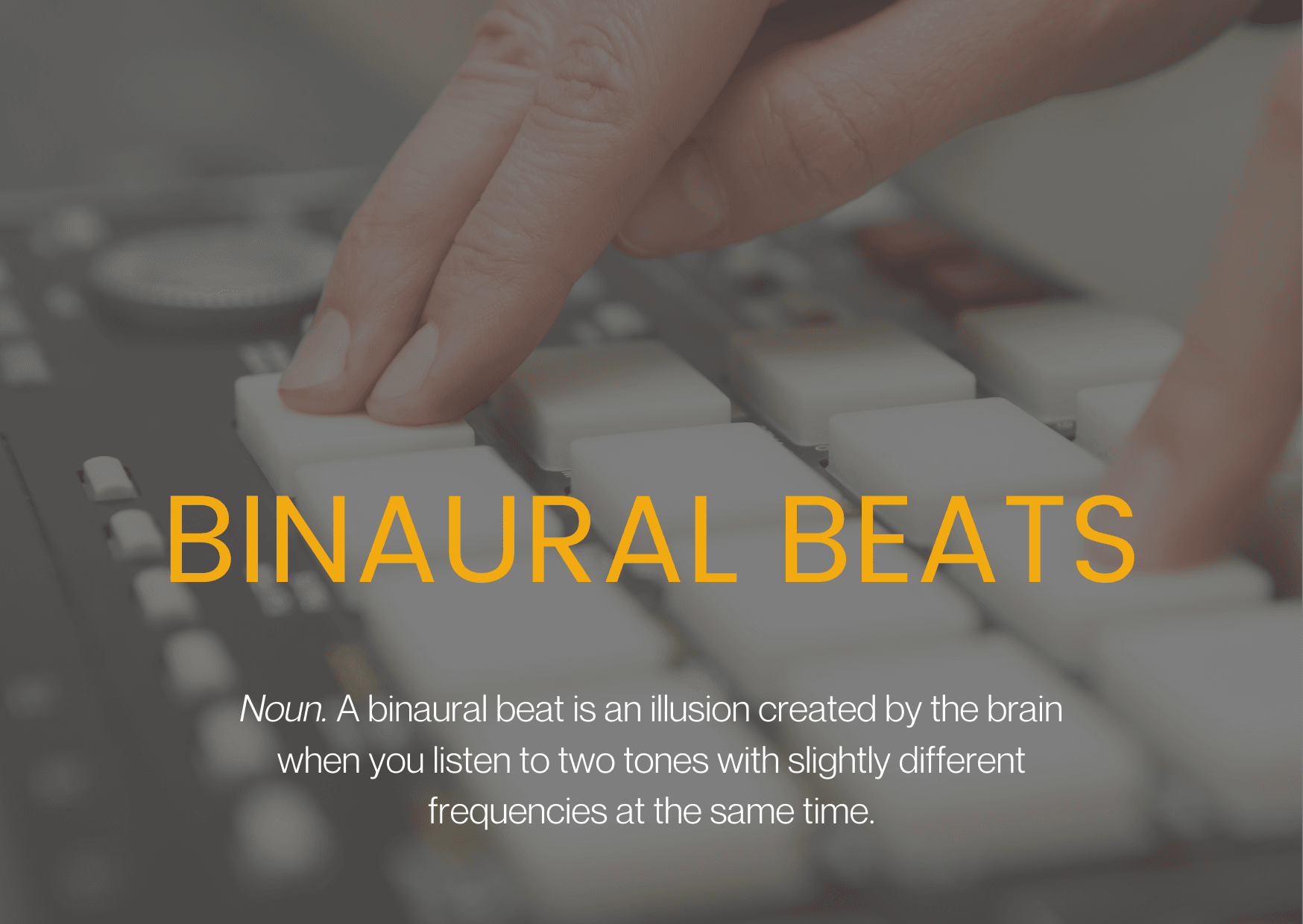
Binaural Beats: What Are They and Do They Benefit Mind and Body?

Article at a glance:
|
Binaural beats are currently a phenomenon, there are playlists and loops on streaming platforms such as Youtube and Spotify. Some are made for studying and concentration, while others can assist with relaxation and pain. Many studies have been conducted on the brain, body and binaural beats since an auditory discovery in 1973 [1] including a study [2] by Heinrich Wilhelm Dove published in 1841 after his discovery of binaural beats in 1839.

What are Binaural Beats?
Binaural beats are two different tones played at the same time. They have slightly different frequencies [3] Binaural beats are best heard with earphones or headphones as each ear will be listening to a different frequency. The two tones align with your brain waves to produce a beat with a different frequency. Many also describe this as an illusion of the brain. This new frequency is the difference between the two original frequencies. For example, the right ear may be listening to a tone with a frequency of 250 Hz and the tone in the left ear is 260 Hz. The new tone heard would be 10 Hz. When listening to binaural beats your brain will match the frequency of the beats. This means binaural beats can assist with achieving certain mental states depending on the frequency.

The Brain and Binaural Beats
The part of the brain that processes binaural beats is called the Superior Olivary Complex and it is located in the brain stem. It synchronises the various activities and neurons of the brain and responds when it hears two close frequencies, creating a binaural beat, which changes the brain waves. The synchronization of the neural activities across the brain is called entrainment. Entrainment is a common brain function and listening to certain binaural beats can increase the strength of brainwaves. There are currently five different binaural frequencies that match certain brainwave frequencies to achieve different results. They are Delta (1-4 Hz), Theta (4-8 Hz), Alpha (8-13 Hz), Beta (115-20 Hz), and Gamma (32-100 Hz) [4]

Binaural Beats Can Affect Sleep
The Delta frequency can assist with sleep. A study [5] conducted in 2018 used a 3 Hz binaural beat to see the effects of the Delta frequency on sleep. Over the three-day study, the group of participants were split into an experimental group and a control group. The experimental group were played pure tones of 250 Hz and 253 Hz to create the 3 Hz binaural beat. The study showed that participants in the experimental group had deeper REM sleep and were able to have restful sleep for a longer duration. The experimental group also woke up feeling more rested.

Anxiety, Mood States and Binaural Beats
One of the benefits of binaural beats is a mood boost and lower anxiety levels. A study [6] from 2011 asked participants from emergency departments to complete self-assessments before and after the study. Participants were given various soundtracks and music with various levels of binaural beats. In moderately anxious participants, anxiety was decreased by 10-15% after the study. Other participants showed a decrease in anxiety while also feeling calmer and more relaxed as well as having a boost in their mood. Another study [7] showed reduced anxiety in both moderate and highly anxious participants. In this study, they also looked at somatic and cognitive state anxiety. Using the theta frequency (4-8 Hz) the study showed the frequency can reduce symptoms of somatic and cognitive anxiety.

Reduced Pain Using Binaural Beat Therapy
A 2020 randomised controlled trial and study [8] worked with chronic pain patients for 30-minutes a day. A binaural beat of 5 Hz was played under simultaneous electroencephalogram recordings. Pain, stress and medication were all monitored throughout the study. Perceived pain was reduced both during and after the 30-minute session. The pain was also reduced after the study was completed. Pain medication intake was also reduced during the study as patients did not feel the need for it. Stress was significantly reduced during the 30-minute sessions as well. The study provided evidence that pain intensity can be reduced using binaural beat therapy and the theta frequency.

Cognition and Memory Improvements
In a study [9] 20 participants a 5 Hz and a 13 Hz auditory stimulation as well as a list of words to recall. The results indicated that the participants could recall a higher number of words after listening to the 5 Hz frequency. Auditory stimulation at 5 Hz over a long period of time can increase brain activity as well as memory and recall. Studies [10] have also looked at the effect of binaural beats on creativity, divergent thinking and convergent thinking. The study looked at different frequencies and gave participants different thinking tasks to complete. The results showed that the binaural beats, at any frequency, increased creativity and divergent thinking, but do not have a large effect on convergent thinking.
Wrapping It Up
Binaural beats affect the Super Olivary Complex and synchronise with brainwaves. They can assist with better and more restful sleep, lower anxiety, boost mood and relieve pain. Binaural beats can assist with brain functions such as memory, creativity and divergent thinking, but do not assist with convergent thinking.
References:
[1] Auditory Beats in The Brain
[2] Beneficial subliminal music: binaural beats, hemi-sync and metamusic
[4] A Brief Study of Binaural Beat: A Means of Brain-Computer Interfacing
[5] A Novel Insight of Effects of a 3-Hz Binaural Beat on Sleep Stages During Sleep
[7] The effects of music & auditory beat stimulation on anxiety: A randomized clinical trial
[9] Impact of auditory stimulation at a frequency of 5 Hz in verbal memory
[10] The impact of binaural beats on creativity
[11] What are ‘binaural beats’ and do they affect our brain?
[12] Auditory Beat Stimulation and its Effects on Cognition and Mood States
[13] The effect of binaural beats on verbal working memory and cortical connectivity
[14] Effects of binaural beats and isochronic tones on brain wave modulation: Literature review







